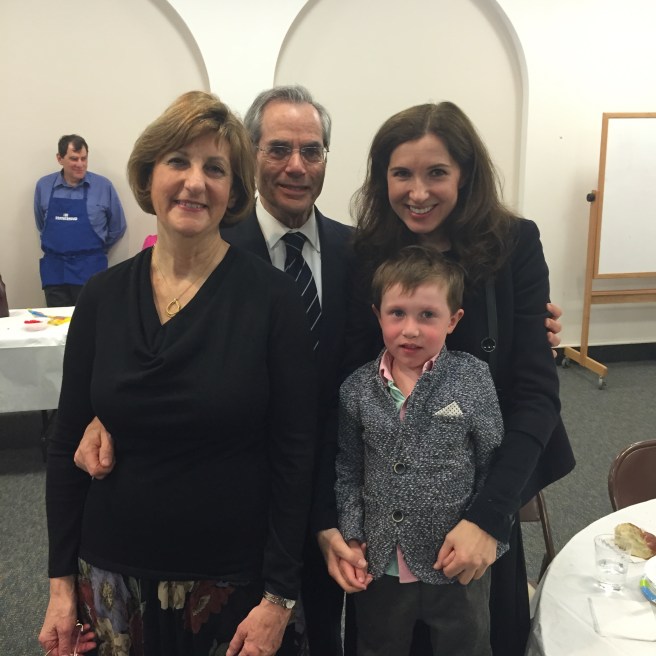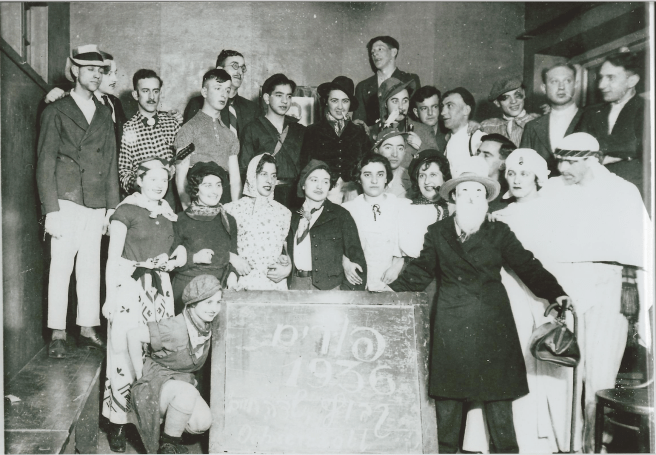https://youtu.be/2R1jiVcIGcg
Just as ‘”Yankee Doodle Dandy” attributes his priorities to the fact that he was born on the Fourth of July, I attribute mine to the fact that I was born on Shabbat Zachor, the Shabbat before Purim.
It has been exactly forty years since I first began reflecting on my life in a sermon. Forty years ago I treated my congregation to an address entitled, “From the Top of the Hill Looking Down, Thoughts on Reaching Thirty.“
On my 30th birthday, March 16, 1976, I was among a group of Baltimore area rabbis gathered in an upscale Spanish restaurant to celebrate the upcoming retirement of Rabbi Abraham Shaw who had spent 40 years as rabbi of one congregation, Oheb Shalom in Baltimore.
As colleagues paid tribute to Rabbi Shaw, I found myself imagining that the gathering was really in honor of my 30th birthday.
I found myself wondering, “What would I want people to say about me when they reflect on my life as a rabbi?”
As I looked around the group I saw some wonderful role models. But I also saw a “scholar rabbi” who spent most of his time studying and writing learned articles read only by specialists. His congregation basked in his reputation as “a brilliant man.”I saw one I considered “a glad hander rabbi,” who always had a smile and a slap on the back for everyone. I saw a “businessman” rabbi who was a Cracker Jack fundraiser, and a great administrator. I knew I did not want to be like them.
I wanted, and I still want to be remembered as a rabbi who cared deeply about his congregants’ lives and whose love of Torah enabled him to help others find greater meaning in its stories.
I never had the privilege or the burden of working with a senior colleague. Surely I could have benefitted from the experience of a wise and seasoned Senior Rabbi. At the same time I am glad that from the outset of my career, I had the opportunity to make my own decisions and my own mistakes.
I have had the privilege of working with younger colleagues in each of the three congregations I served. Some of these relationships were wonderfully harmonious and successful. Some, I acknowledge, were not.
I take a good measure—though not all of—the responsibility for those partnerships that were less than mutually enriching. There were times when I should have stepped back instead of stepping in, and there were times when I should have listened more and talked less.
Certainly, I have made other mistakes and not—as Frank Sinatra sang—“too few to mention.” At times I have been too focused on what people think of me and at times insufficiently sensitive as to what the impact of my words and actions on others would be. I own these shortcomings and still try to work on them.
I am also very intense, and some find that intensity off putting. If I could live my life over again, I would dial it back a bit.
But, I would emphasize, that very intensity also drove me and continues to drive me to do things as well as I possibly can.
I can honestly say that I have never “phoned in” a baby naming, Bar or Bat Mitzvah, a wedding a lesson, a sermon or a funeral.
Yes, I am proud that in some ways the life course I envisioned for myself in that Baltimore restaurant eventuated as I hoped.
But when I was thirty, I had no idea how important the lessons of the Purim story would become to me.
I have always loved Purim. The first real responsibility I took on in my high school youth group—long before I considered becoming a rabbi–was to chair the Purim Carnival at our Synagogue.
Our work in Germany for the past two years ties directly to Purim and to the special Torah reading for this Shabbat from Deuteronomy (25:17-19) “Remember … Do not forget!”
The first time I read these words in my first congregation in Columbia, Maryland, Father George Cora, of blessed memory, head of the local Catholic Church, was among the worshippers. Afterward he challenged me, “Why do you feel commanded to remember the past? Isn’t it time to move on and focus on the future?”
I had not yet learned George Santayana’s famous quotation, ““Those who fail to learn from history are doomed to repeat it”.
Even so, I responded then as I do now. We must learn from the lessons of the past in order to shape a better future.
Fast forward forty years, and the answer I gave to Father Cora resembles the answer I give when people ask why we spent ten weeks these past two years in Germany and why we plan to return this coming fall:
We cannot undo the past, but the future is ours to shape!
I also love the Purim story for what it teaches us about our destiny in life.
In the Purim story Esther’s heroism averts the tragedy Haman planned.
But she was reluctant to go to the King. When he heard that, Mordechai’s message to her was clear: You must! Who knows, he “texted her” through their go between, Hatach, if you did not get to be queen just for this opportunity that only you have to make a difference.
And so she went
I believe each of us has these moments in our lives.
The first one I remember was when I was fifteen and walking to our synagogue’s Chanukah celebration.
I stopped in to buy my girlfriend a gift when a girl about ten years old entered the store. She was literally dressed in rags and reminded me of the Little Match Girl of Hans Christian Anderson’s famous story.
“I want to buy a Christmas present for my Mother,” the girl told the storekeeper, “but I don’t have much money.
The man showed her a few inexpensive items, and when she saw one she liked, she asked how much it was”
The girl frowned when he told her the price, and she realized after counting her money, that what she had was not enough.
To this day I believe the Eternal One put me in that store at that moment so that I could make up the difference between the amount of money the little girl had and the cost of the gift.
I believe these moments when we like Esther have a chance to make a difference come to all of us. But we must be on the alert for them. Or they can quickly pass us by.
The rabbis say that a burning bush was an odd way for God to manifest the Divine Presence to Moses.
After all burning bushes are not so unusual in the desert. But only because Moses was on the alert did he realize the bush was not consumed and contained a life changing message for him.
That is why Vickie and I went to Germany.
We had opportunities to:
- Teach German high school students that they are not responsible for what happened, but only through learning about it can they prevent such things in the future.
- Conduct holy day services in synagogues that would have gone without a rabbi.
- Share the approach to Torah in my book, What’s in It for Me? Finding Ourselves in Biblical Narratives with audiences that had always felt they had to choose either to take the Bible literally or dismiss its stories as quaint fairy tales.
- Speak in more than fifteen churches where a rabbi had never spoken before and where many of the worshippers had never seen a living, breathing Jew before.
- Speak at three Kristallnacht commemoratives in Leipzig, the city where my father, z’l, was arrested on that fateful night.
- Conduct the first Jewish service in the city of Friedrichsstadt since before World War II.
- Offer Seminars and lectures at the Abraham Geiger College and the University of Hamburg.
In the scheme of things these are not great accomplishments. We did not cure cancer or make peace in the Middle East. But we made a difference.
I am proud that we have taken advantage of these opportunities, and I hope we can always be on the alert for moments when destiny calls to us with the message of the Purim story:
Who knows if you are not where you are just for the opportunity to make small difference for good in peoples’ lives?
.



 In little more than a month, Purim will be here again. In addition to masks, groggers, and fun-filled Purim spiels, I hope part of our preparation focuses on the vital messages this festival and the Book of Esther, the text that underlies it, send to us today
In little more than a month, Purim will be here again. In addition to masks, groggers, and fun-filled Purim spiels, I hope part of our preparation focuses on the vital messages this festival and the Book of Esther, the text that underlies it, send to us today